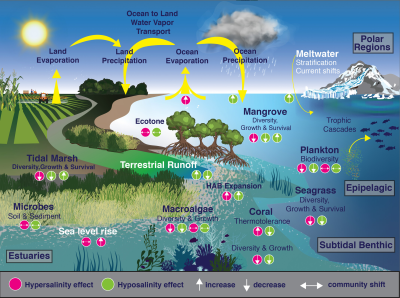Human-Driven Ocean Change: More Than Just Warming
In collaboration with a team of European, UK, Australian, and US collaborators, Lawrence Livermore Lab scientists developed a new framework to assess physical climate change impacts on marine habitability. This framework assessed the impact of water cycle-driven ocean salinity changes, in contrast to the better-assessed impacts of ocean warming and acidification. It discovered a surprising and remarkable sensitivity of numerous marine habits to salinity changes, in some locations, projected salinity change was the primary driver leading to reduced habitability for marine species.
This latest work highlights the surprising impact of salinity change. For some locations, salinity change is the leading term that defines habitat suitability, more impactful than warming alone. As climate change progresses, salinity changes, in addition to ocean warming and continuing acidification will continue to mount pressure on marine ecosystems, leading to ecophysiological pressures that drive species loss in certain hotspot regions. The work advocates that salinity change stress, in addition to the more common ocean warming and acidification should be collectively assessed. The work advocates for baseline habitability studies that consider the role of salinity and ensure that this essential climate variable and impacts related to its change are considered in the maintenance and augmentation of the ocean observing system.
The global ocean plays an outsized role in ongoing climate change. It is responsible for 91% of excess heat and 26% of excess CO2 storage over the most recent decade, with a similar rate recorded over earlier periods. In addition to its role in the physical system, ocean ecosystem services are a very significant contributor to the global economy. Previous work suggested that loss of coral reef services (nutrition, coastal protection, and tourism) would equate to an annual USD$375 billion loss, with seagrass meadows, marsh grasses, and mangrove ecosystems providing a carbon value of USD$22-31 million, just for Australia. Consequently, any modulation of the role of the ocean due to climate change will have large ecophysiological and economic impacts, and improving our understanding of this complex system, and human dependence on its services is key.
The review considered the open ocean (epipelagic, and deep pelagic ecosystems), polar, and coastal (benthic subtidal coral reefs, benthic intertidal estuarine continuum, and the littoral zone) zones, focusing on keystone species that occupy these ecosystems. Focusing on the end of the century (2071-2100) changes, both projected salinity and temperature changes were assessed from three CMIP6 ScenarioMIP storylines (SSP1-2.6, SSP3-7.0, and SSP5-8.5). Select ecosystem examples were then chosen, with the impact of physical ocean property changes assessed. These showed pronounced impacts, with strong reductions in habitat suitability for coral reefs across the Marshall Islands, the federated states of Micronesia, and surrounding South Pacific Island countries. Similar profound impacts were reported for a Trades-like plankton community in tropical latitudes.
This new work highlights that detailed data on the salinity change impacts for the vast majority of ecologically and economically important ecosystems are lacking, and that future work needs to account for a systematic deficiency in understanding.

